Impact of International Financial Reporting Standards on Investors
VerifiedAdded on 2020/04/15
|25
|6005
|57
Report
AI Summary
This report delves into the significance of International Financial Reporting Standards (IFRS) and their implications for investors. It explores the advantages, such as increased comparability, transparency, and access to detailed financial information, which can lead to better-informed investment decisions and reduced capital costs. The report also addresses the disadvantages, including the high implementation costs, potential for manipulation due to the flexibility in applying standards, and the challenges of global acceptance. The study examines the impact of IFRS on various factors affecting investors, including the timeliness of loss recognition and the convergence of financial statements. It also highlights the importance of understanding IFRS for making informed investment choices, considering both the benefits and the potential drawbacks. The methodology includes a literature review, sample selection, and variable selection, to provide a comprehensive analysis of the topic.
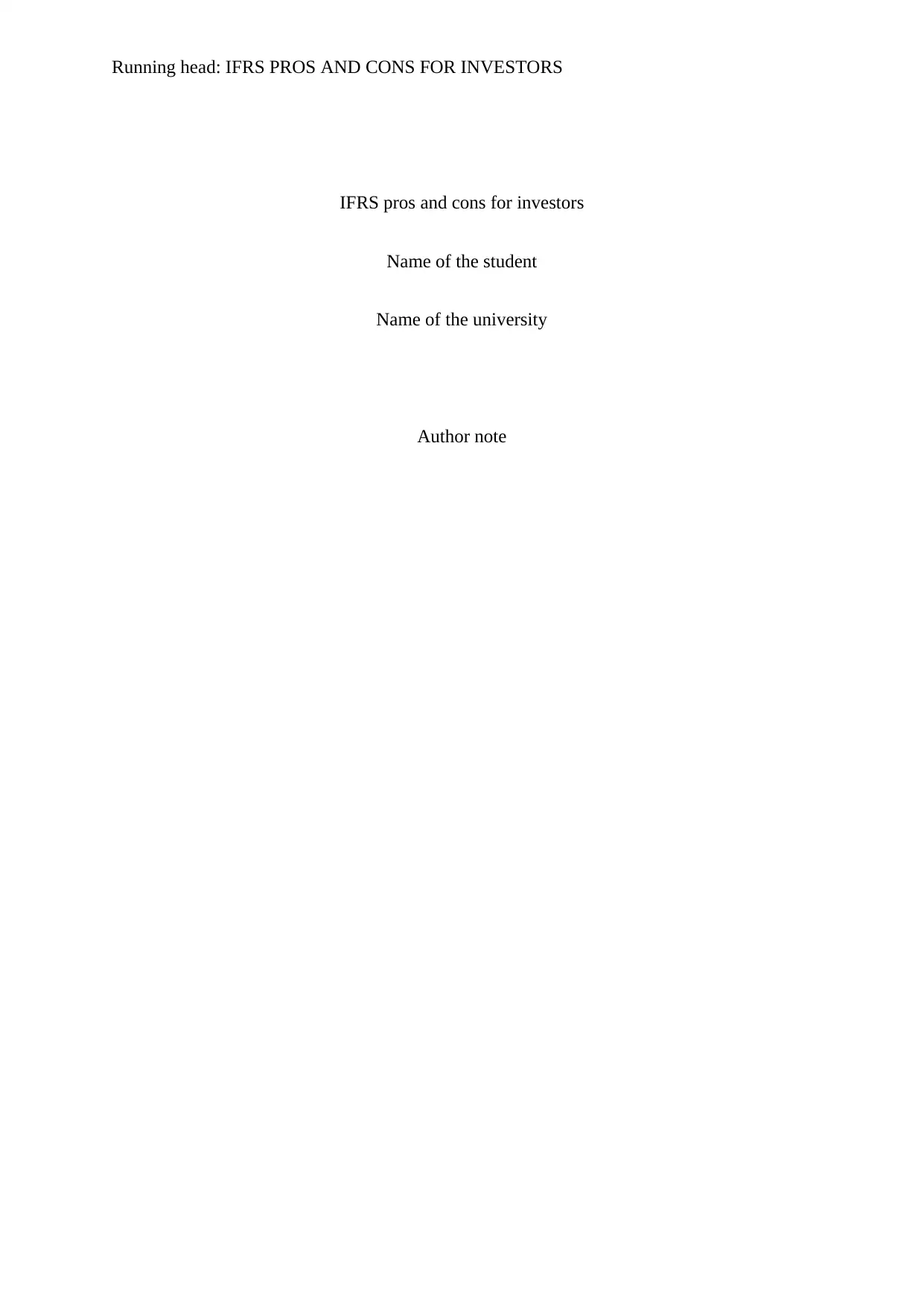
Running head: IFRS PROS AND CONS FOR INVESTORS
IFRS pros and cons for investors
Name of the student
Name of the university
Author note
IFRS pros and cons for investors
Name of the student
Name of the university
Author note
Paraphrase This Document
Need a fresh take? Get an instant paraphrase of this document with our AI Paraphraser
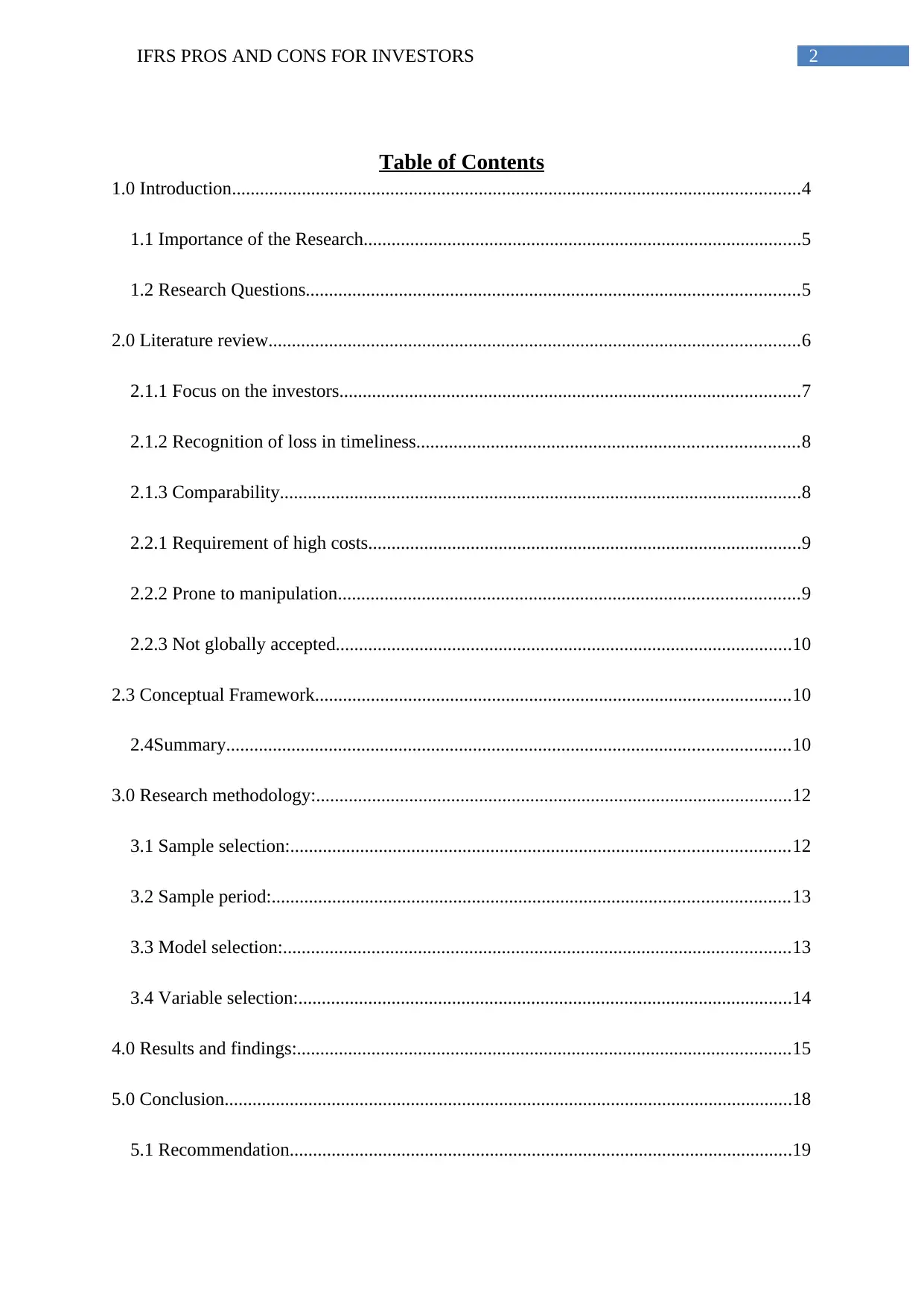
2IFRS PROS AND CONS FOR INVESTORS
Table of Contents
1.0 Introduction..........................................................................................................................4
1.1 Importance of the Research..............................................................................................5
1.2 Research Questions..........................................................................................................5
2.0 Literature review..................................................................................................................6
2.1.1 Focus on the investors...................................................................................................7
2.1.2 Recognition of loss in timeliness..................................................................................8
2.1.3 Comparability................................................................................................................8
2.2.1 Requirement of high costs.............................................................................................9
2.2.2 Prone to manipulation...................................................................................................9
2.2.3 Not globally accepted..................................................................................................10
2.3 Conceptual Framework......................................................................................................10
2.4Summary.........................................................................................................................10
3.0 Research methodology:......................................................................................................12
3.1 Sample selection:...........................................................................................................12
3.2 Sample period:...............................................................................................................13
3.3 Model selection:.............................................................................................................13
3.4 Variable selection:..........................................................................................................14
4.0 Results and findings:..........................................................................................................15
5.0 Conclusion..........................................................................................................................18
5.1 Recommendation............................................................................................................19
Table of Contents
1.0 Introduction..........................................................................................................................4
1.1 Importance of the Research..............................................................................................5
1.2 Research Questions..........................................................................................................5
2.0 Literature review..................................................................................................................6
2.1.1 Focus on the investors...................................................................................................7
2.1.2 Recognition of loss in timeliness..................................................................................8
2.1.3 Comparability................................................................................................................8
2.2.1 Requirement of high costs.............................................................................................9
2.2.2 Prone to manipulation...................................................................................................9
2.2.3 Not globally accepted..................................................................................................10
2.3 Conceptual Framework......................................................................................................10
2.4Summary.........................................................................................................................10
3.0 Research methodology:......................................................................................................12
3.1 Sample selection:...........................................................................................................12
3.2 Sample period:...............................................................................................................13
3.3 Model selection:.............................................................................................................13
3.4 Variable selection:..........................................................................................................14
4.0 Results and findings:..........................................................................................................15
5.0 Conclusion..........................................................................................................................18
5.1 Recommendation............................................................................................................19

3IFRS PROS AND CONS FOR INVESTORS
Reference..................................................................................................................................20
Reference..................................................................................................................................20
⊘ This is a preview!⊘
Do you want full access?
Subscribe today to unlock all pages.

Trusted by 1+ million students worldwide
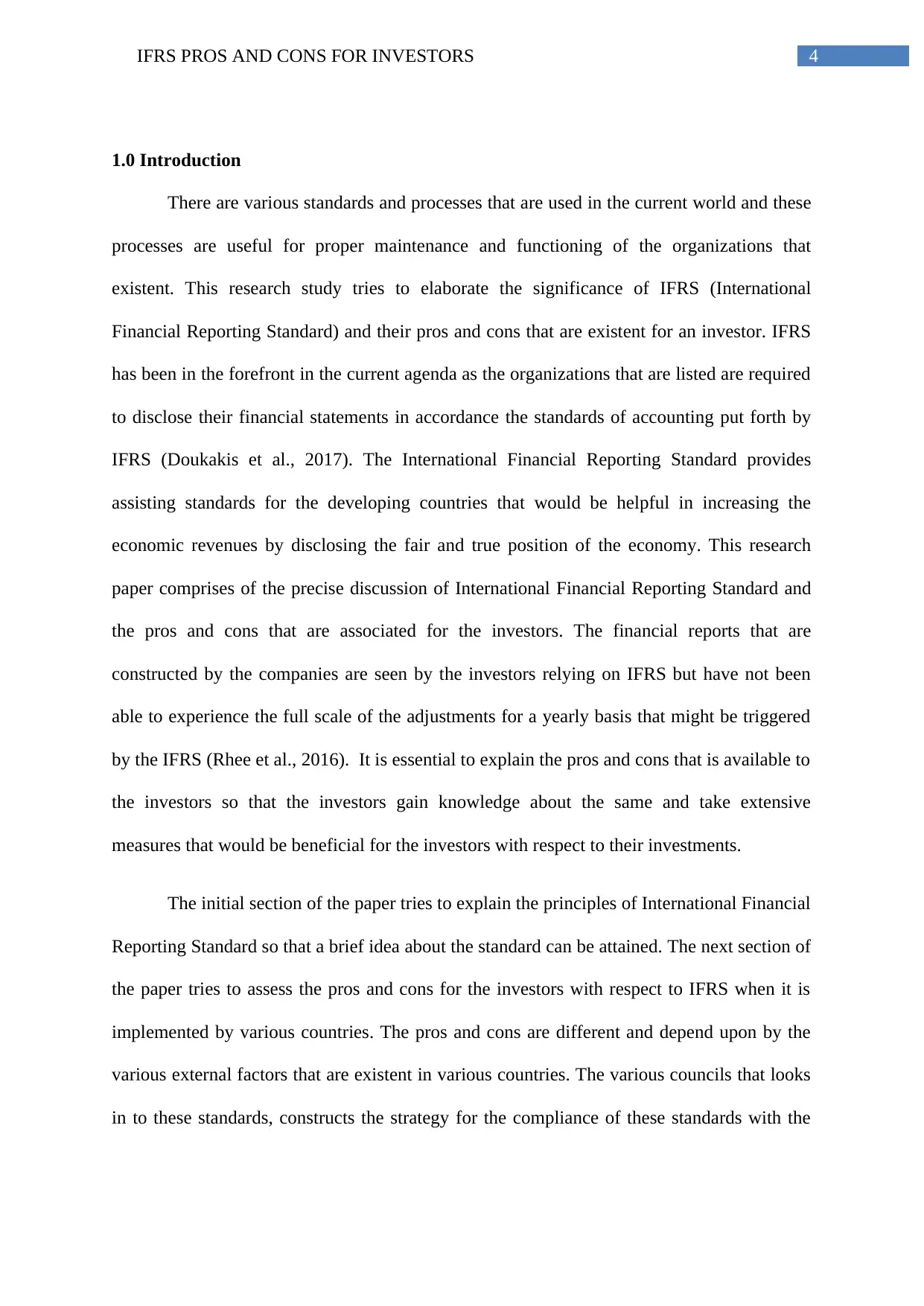
4IFRS PROS AND CONS FOR INVESTORS
1.0 Introduction
There are various standards and processes that are used in the current world and these
processes are useful for proper maintenance and functioning of the organizations that
existent. This research study tries to elaborate the significance of IFRS (International
Financial Reporting Standard) and their pros and cons that are existent for an investor. IFRS
has been in the forefront in the current agenda as the organizations that are listed are required
to disclose their financial statements in accordance the standards of accounting put forth by
IFRS (Doukakis et al., 2017). The International Financial Reporting Standard provides
assisting standards for the developing countries that would be helpful in increasing the
economic revenues by disclosing the fair and true position of the economy. This research
paper comprises of the precise discussion of International Financial Reporting Standard and
the pros and cons that are associated for the investors. The financial reports that are
constructed by the companies are seen by the investors relying on IFRS but have not been
able to experience the full scale of the adjustments for a yearly basis that might be triggered
by the IFRS (Rhee et al., 2016). It is essential to explain the pros and cons that is available to
the investors so that the investors gain knowledge about the same and take extensive
measures that would be beneficial for the investors with respect to their investments.
The initial section of the paper tries to explain the principles of International Financial
Reporting Standard so that a brief idea about the standard can be attained. The next section of
the paper tries to assess the pros and cons for the investors with respect to IFRS when it is
implemented by various countries. The pros and cons are different and depend upon by the
various external factors that are existent in various countries. The various councils that looks
in to these standards, constructs the strategy for the compliance of these standards with the
1.0 Introduction
There are various standards and processes that are used in the current world and these
processes are useful for proper maintenance and functioning of the organizations that
existent. This research study tries to elaborate the significance of IFRS (International
Financial Reporting Standard) and their pros and cons that are existent for an investor. IFRS
has been in the forefront in the current agenda as the organizations that are listed are required
to disclose their financial statements in accordance the standards of accounting put forth by
IFRS (Doukakis et al., 2017). The International Financial Reporting Standard provides
assisting standards for the developing countries that would be helpful in increasing the
economic revenues by disclosing the fair and true position of the economy. This research
paper comprises of the precise discussion of International Financial Reporting Standard and
the pros and cons that are associated for the investors. The financial reports that are
constructed by the companies are seen by the investors relying on IFRS but have not been
able to experience the full scale of the adjustments for a yearly basis that might be triggered
by the IFRS (Rhee et al., 2016). It is essential to explain the pros and cons that is available to
the investors so that the investors gain knowledge about the same and take extensive
measures that would be beneficial for the investors with respect to their investments.
The initial section of the paper tries to explain the principles of International Financial
Reporting Standard so that a brief idea about the standard can be attained. The next section of
the paper tries to assess the pros and cons for the investors with respect to IFRS when it is
implemented by various countries. The pros and cons are different and depend upon by the
various external factors that are existent in various countries. The various councils that looks
in to these standards, constructs the strategy for the compliance of these standards with the
Paraphrase This Document
Need a fresh take? Get an instant paraphrase of this document with our AI Paraphraser
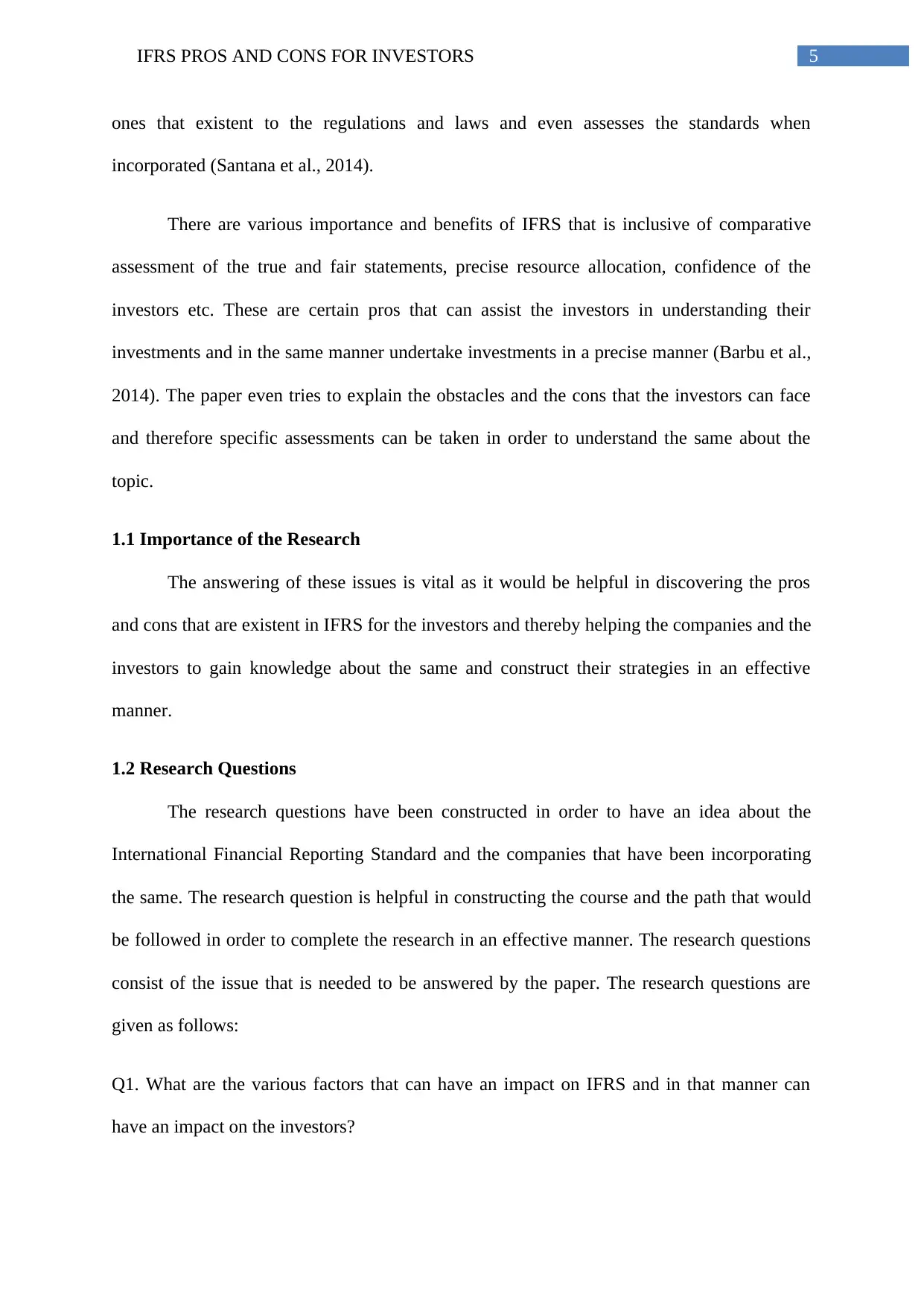
5IFRS PROS AND CONS FOR INVESTORS
ones that existent to the regulations and laws and even assesses the standards when
incorporated (Santana et al., 2014).
There are various importance and benefits of IFRS that is inclusive of comparative
assessment of the true and fair statements, precise resource allocation, confidence of the
investors etc. These are certain pros that can assist the investors in understanding their
investments and in the same manner undertake investments in a precise manner (Barbu et al.,
2014). The paper even tries to explain the obstacles and the cons that the investors can face
and therefore specific assessments can be taken in order to understand the same about the
topic.
1.1 Importance of the Research
The answering of these issues is vital as it would be helpful in discovering the pros
and cons that are existent in IFRS for the investors and thereby helping the companies and the
investors to gain knowledge about the same and construct their strategies in an effective
manner.
1.2 Research Questions
The research questions have been constructed in order to have an idea about the
International Financial Reporting Standard and the companies that have been incorporating
the same. The research question is helpful in constructing the course and the path that would
be followed in order to complete the research in an effective manner. The research questions
consist of the issue that is needed to be answered by the paper. The research questions are
given as follows:
Q1. What are the various factors that can have an impact on IFRS and in that manner can
have an impact on the investors?
ones that existent to the regulations and laws and even assesses the standards when
incorporated (Santana et al., 2014).
There are various importance and benefits of IFRS that is inclusive of comparative
assessment of the true and fair statements, precise resource allocation, confidence of the
investors etc. These are certain pros that can assist the investors in understanding their
investments and in the same manner undertake investments in a precise manner (Barbu et al.,
2014). The paper even tries to explain the obstacles and the cons that the investors can face
and therefore specific assessments can be taken in order to understand the same about the
topic.
1.1 Importance of the Research
The answering of these issues is vital as it would be helpful in discovering the pros
and cons that are existent in IFRS for the investors and thereby helping the companies and the
investors to gain knowledge about the same and construct their strategies in an effective
manner.
1.2 Research Questions
The research questions have been constructed in order to have an idea about the
International Financial Reporting Standard and the companies that have been incorporating
the same. The research question is helpful in constructing the course and the path that would
be followed in order to complete the research in an effective manner. The research questions
consist of the issue that is needed to be answered by the paper. The research questions are
given as follows:
Q1. What are the various factors that can have an impact on IFRS and in that manner can
have an impact on the investors?
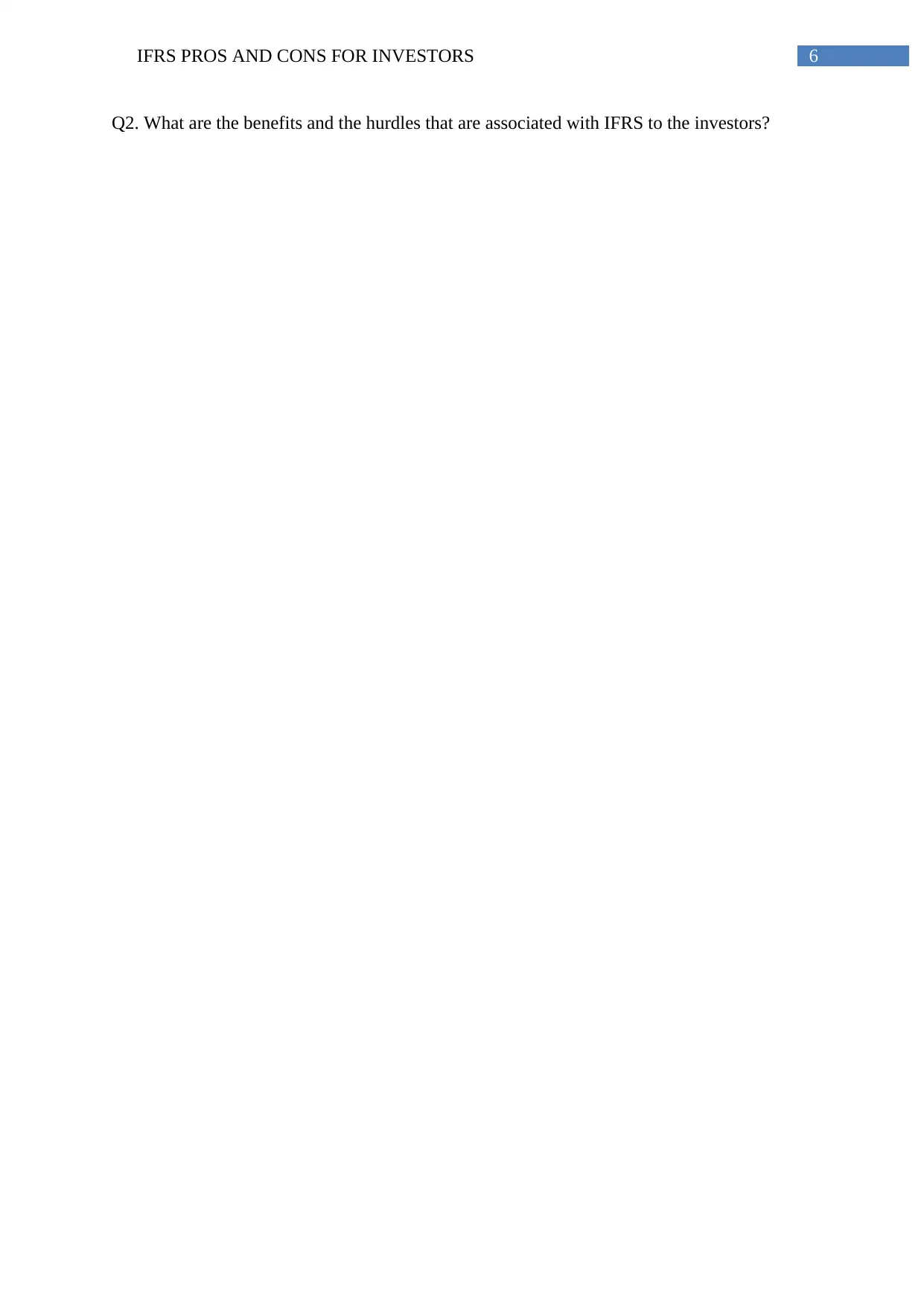
6IFRS PROS AND CONS FOR INVESTORS
Q2. What are the benefits and the hurdles that are associated with IFRS to the investors?
Q2. What are the benefits and the hurdles that are associated with IFRS to the investors?
⊘ This is a preview!⊘
Do you want full access?
Subscribe today to unlock all pages.

Trusted by 1+ million students worldwide
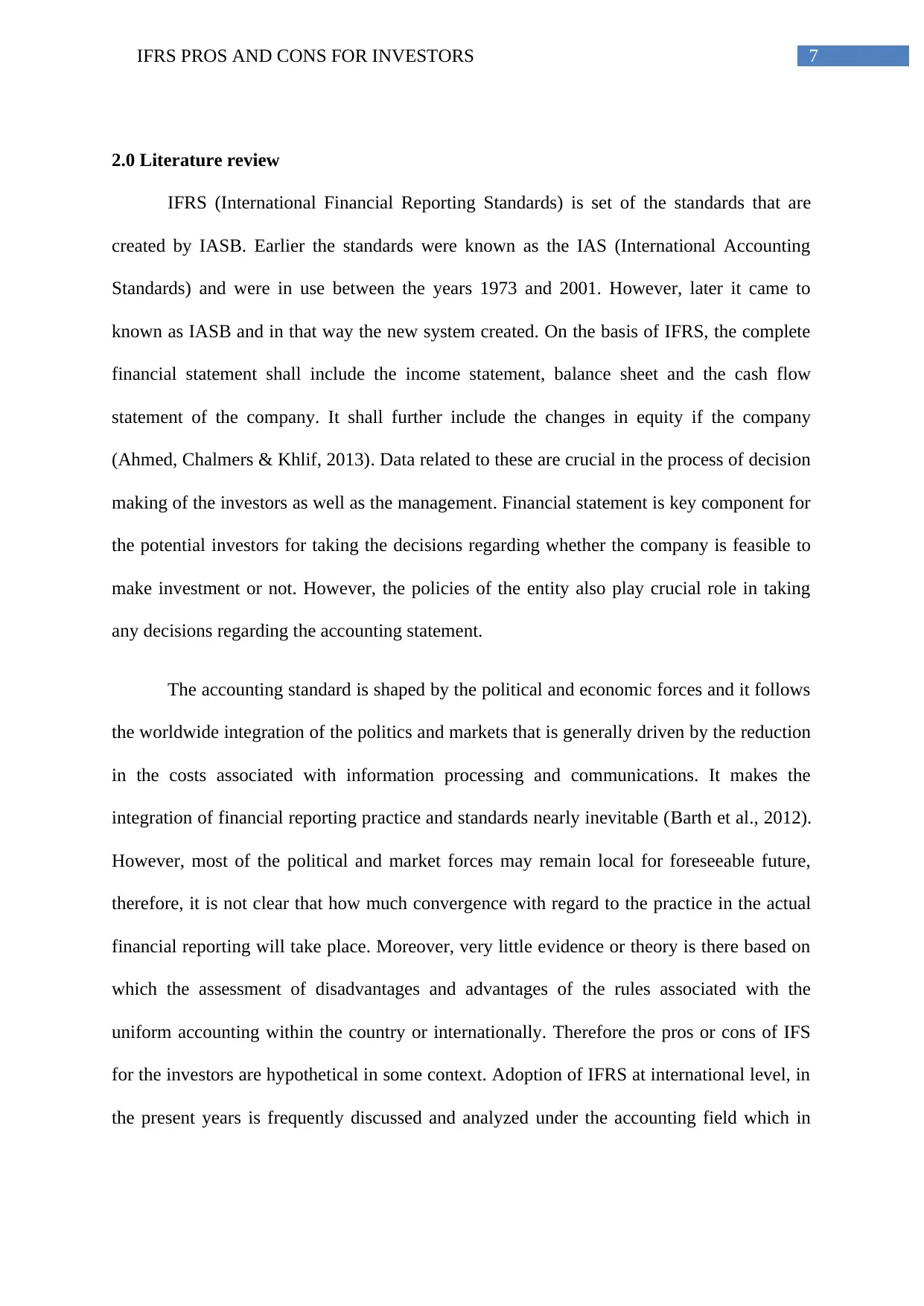
7IFRS PROS AND CONS FOR INVESTORS
2.0 Literature review
IFRS (International Financial Reporting Standards) is set of the standards that are
created by IASB. Earlier the standards were known as the IAS (International Accounting
Standards) and were in use between the years 1973 and 2001. However, later it came to
known as IASB and in that way the new system created. On the basis of IFRS, the complete
financial statement shall include the income statement, balance sheet and the cash flow
statement of the company. It shall further include the changes in equity if the company
(Ahmed, Chalmers & Khlif, 2013). Data related to these are crucial in the process of decision
making of the investors as well as the management. Financial statement is key component for
the potential investors for taking the decisions regarding whether the company is feasible to
make investment or not. However, the policies of the entity also play crucial role in taking
any decisions regarding the accounting statement.
The accounting standard is shaped by the political and economic forces and it follows
the worldwide integration of the politics and markets that is generally driven by the reduction
in the costs associated with information processing and communications. It makes the
integration of financial reporting practice and standards nearly inevitable (Barth et al., 2012).
However, most of the political and market forces may remain local for foreseeable future,
therefore, it is not clear that how much convergence with regard to the practice in the actual
financial reporting will take place. Moreover, very little evidence or theory is there based on
which the assessment of disadvantages and advantages of the rules associated with the
uniform accounting within the country or internationally. Therefore the pros or cons of IFS
for the investors are hypothetical in some context. Adoption of IFRS at international level, in
the present years is frequently discussed and analyzed under the accounting field which in
2.0 Literature review
IFRS (International Financial Reporting Standards) is set of the standards that are
created by IASB. Earlier the standards were known as the IAS (International Accounting
Standards) and were in use between the years 1973 and 2001. However, later it came to
known as IASB and in that way the new system created. On the basis of IFRS, the complete
financial statement shall include the income statement, balance sheet and the cash flow
statement of the company. It shall further include the changes in equity if the company
(Ahmed, Chalmers & Khlif, 2013). Data related to these are crucial in the process of decision
making of the investors as well as the management. Financial statement is key component for
the potential investors for taking the decisions regarding whether the company is feasible to
make investment or not. However, the policies of the entity also play crucial role in taking
any decisions regarding the accounting statement.
The accounting standard is shaped by the political and economic forces and it follows
the worldwide integration of the politics and markets that is generally driven by the reduction
in the costs associated with information processing and communications. It makes the
integration of financial reporting practice and standards nearly inevitable (Barth et al., 2012).
However, most of the political and market forces may remain local for foreseeable future,
therefore, it is not clear that how much convergence with regard to the practice in the actual
financial reporting will take place. Moreover, very little evidence or theory is there based on
which the assessment of disadvantages and advantages of the rules associated with the
uniform accounting within the country or internationally. Therefore the pros or cons of IFS
for the investors are hypothetical in some context. Adoption of IFRS at international level, in
the present years is frequently discussed and analyzed under the accounting field which in
Paraphrase This Document
Need a fresh take? Get an instant paraphrase of this document with our AI Paraphraser
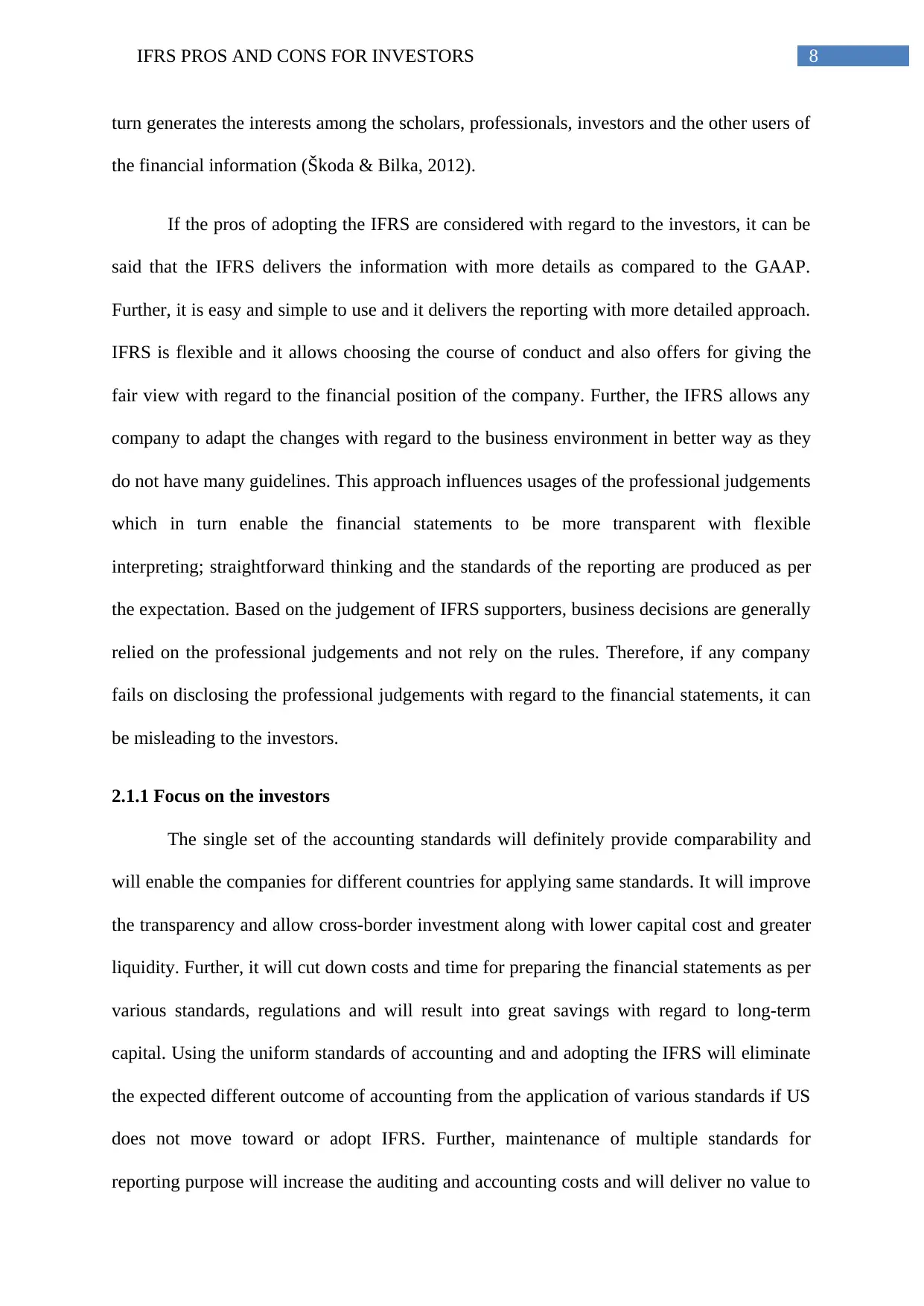
8IFRS PROS AND CONS FOR INVESTORS
turn generates the interests among the scholars, professionals, investors and the other users of
the financial information (Škoda & Bilka, 2012).
If the pros of adopting the IFRS are considered with regard to the investors, it can be
said that the IFRS delivers the information with more details as compared to the GAAP.
Further, it is easy and simple to use and it delivers the reporting with more detailed approach.
IFRS is flexible and it allows choosing the course of conduct and also offers for giving the
fair view with regard to the financial position of the company. Further, the IFRS allows any
company to adapt the changes with regard to the business environment in better way as they
do not have many guidelines. This approach influences usages of the professional judgements
which in turn enable the financial statements to be more transparent with flexible
interpreting; straightforward thinking and the standards of the reporting are produced as per
the expectation. Based on the judgement of IFRS supporters, business decisions are generally
relied on the professional judgements and not rely on the rules. Therefore, if any company
fails on disclosing the professional judgements with regard to the financial statements, it can
be misleading to the investors.
2.1.1 Focus on the investors
The single set of the accounting standards will definitely provide comparability and
will enable the companies for different countries for applying same standards. It will improve
the transparency and allow cross-border investment along with lower capital cost and greater
liquidity. Further, it will cut down costs and time for preparing the financial statements as per
various standards, regulations and will result into great savings with regard to long-term
capital. Using the uniform standards of accounting and and adopting the IFRS will eliminate
the expected different outcome of accounting from the application of various standards if US
does not move toward or adopt IFRS. Further, maintenance of multiple standards for
reporting purpose will increase the auditing and accounting costs and will deliver no value to
turn generates the interests among the scholars, professionals, investors and the other users of
the financial information (Škoda & Bilka, 2012).
If the pros of adopting the IFRS are considered with regard to the investors, it can be
said that the IFRS delivers the information with more details as compared to the GAAP.
Further, it is easy and simple to use and it delivers the reporting with more detailed approach.
IFRS is flexible and it allows choosing the course of conduct and also offers for giving the
fair view with regard to the financial position of the company. Further, the IFRS allows any
company to adapt the changes with regard to the business environment in better way as they
do not have many guidelines. This approach influences usages of the professional judgements
which in turn enable the financial statements to be more transparent with flexible
interpreting; straightforward thinking and the standards of the reporting are produced as per
the expectation. Based on the judgement of IFRS supporters, business decisions are generally
relied on the professional judgements and not rely on the rules. Therefore, if any company
fails on disclosing the professional judgements with regard to the financial statements, it can
be misleading to the investors.
2.1.1 Focus on the investors
The single set of the accounting standards will definitely provide comparability and
will enable the companies for different countries for applying same standards. It will improve
the transparency and allow cross-border investment along with lower capital cost and greater
liquidity. Further, it will cut down costs and time for preparing the financial statements as per
various standards, regulations and will result into great savings with regard to long-term
capital. Using the uniform standards of accounting and and adopting the IFRS will eliminate
the expected different outcome of accounting from the application of various standards if US
does not move toward or adopt IFRS. Further, maintenance of multiple standards for
reporting purpose will increase the auditing and accounting costs and will deliver no value to
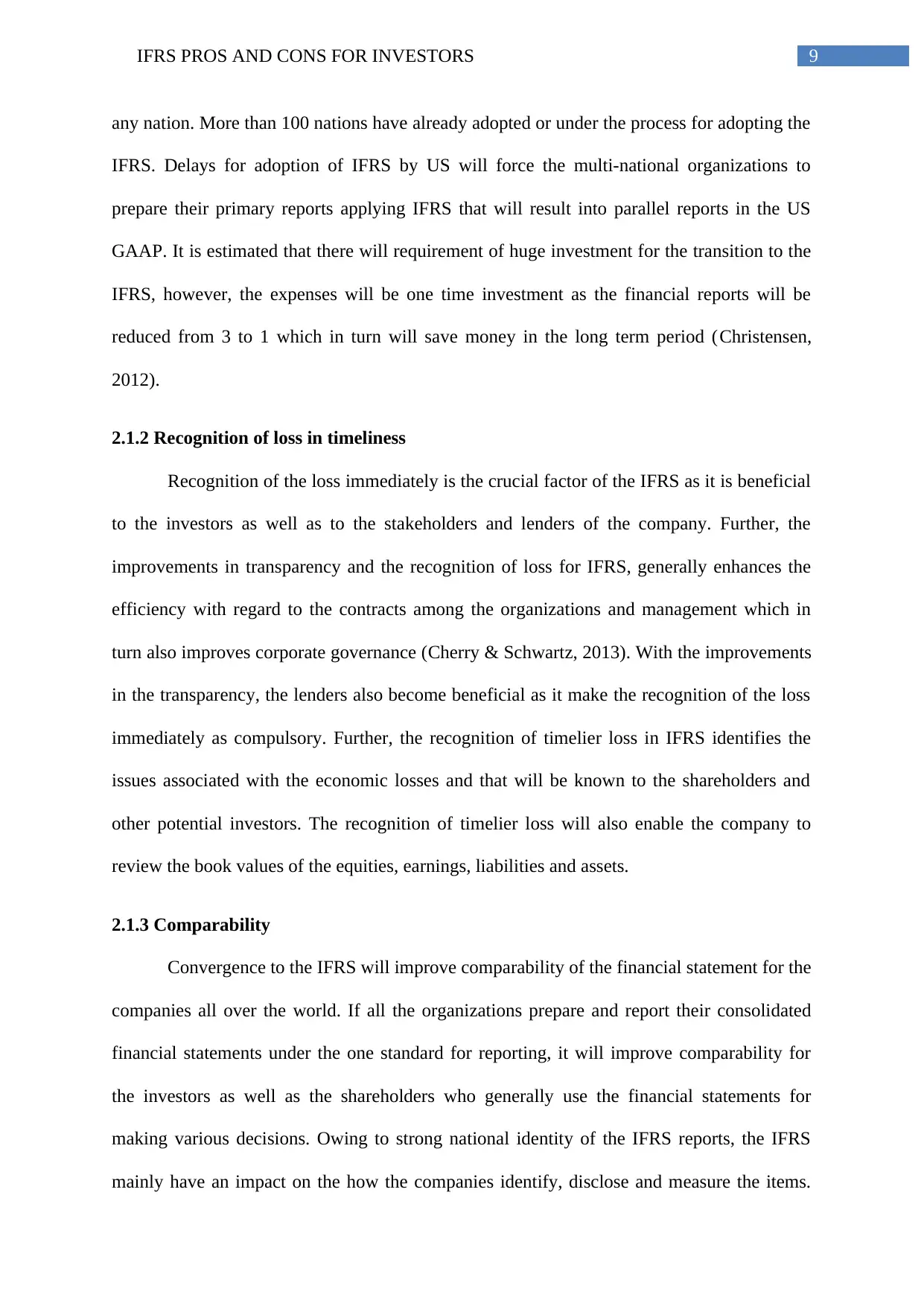
9IFRS PROS AND CONS FOR INVESTORS
any nation. More than 100 nations have already adopted or under the process for adopting the
IFRS. Delays for adoption of IFRS by US will force the multi-national organizations to
prepare their primary reports applying IFRS that will result into parallel reports in the US
GAAP. It is estimated that there will requirement of huge investment for the transition to the
IFRS, however, the expenses will be one time investment as the financial reports will be
reduced from 3 to 1 which in turn will save money in the long term period (Christensen,
2012).
2.1.2 Recognition of loss in timeliness
Recognition of the loss immediately is the crucial factor of the IFRS as it is beneficial
to the investors as well as to the stakeholders and lenders of the company. Further, the
improvements in transparency and the recognition of loss for IFRS, generally enhances the
efficiency with regard to the contracts among the organizations and management which in
turn also improves corporate governance (Cherry & Schwartz, 2013). With the improvements
in the transparency, the lenders also become beneficial as it make the recognition of the loss
immediately as compulsory. Further, the recognition of timelier loss in IFRS identifies the
issues associated with the economic losses and that will be known to the shareholders and
other potential investors. The recognition of timelier loss will also enable the company to
review the book values of the equities, earnings, liabilities and assets.
2.1.3 Comparability
Convergence to the IFRS will improve comparability of the financial statement for the
companies all over the world. If all the organizations prepare and report their consolidated
financial statements under the one standard for reporting, it will improve comparability for
the investors as well as the shareholders who generally use the financial statements for
making various decisions. Owing to strong national identity of the IFRS reports, the IFRS
mainly have an impact on the how the companies identify, disclose and measure the items.
any nation. More than 100 nations have already adopted or under the process for adopting the
IFRS. Delays for adoption of IFRS by US will force the multi-national organizations to
prepare their primary reports applying IFRS that will result into parallel reports in the US
GAAP. It is estimated that there will requirement of huge investment for the transition to the
IFRS, however, the expenses will be one time investment as the financial reports will be
reduced from 3 to 1 which in turn will save money in the long term period (Christensen,
2012).
2.1.2 Recognition of loss in timeliness
Recognition of the loss immediately is the crucial factor of the IFRS as it is beneficial
to the investors as well as to the stakeholders and lenders of the company. Further, the
improvements in transparency and the recognition of loss for IFRS, generally enhances the
efficiency with regard to the contracts among the organizations and management which in
turn also improves corporate governance (Cherry & Schwartz, 2013). With the improvements
in the transparency, the lenders also become beneficial as it make the recognition of the loss
immediately as compulsory. Further, the recognition of timelier loss in IFRS identifies the
issues associated with the economic losses and that will be known to the shareholders and
other potential investors. The recognition of timelier loss will also enable the company to
review the book values of the equities, earnings, liabilities and assets.
2.1.3 Comparability
Convergence to the IFRS will improve comparability of the financial statement for the
companies all over the world. If all the organizations prepare and report their consolidated
financial statements under the one standard for reporting, it will improve comparability for
the investors as well as the shareholders who generally use the financial statements for
making various decisions. Owing to strong national identity of the IFRS reports, the IFRS
mainly have an impact on the how the companies identify, disclose and measure the items.
⊘ This is a preview!⊘
Do you want full access?
Subscribe today to unlock all pages.

Trusted by 1+ million students worldwide
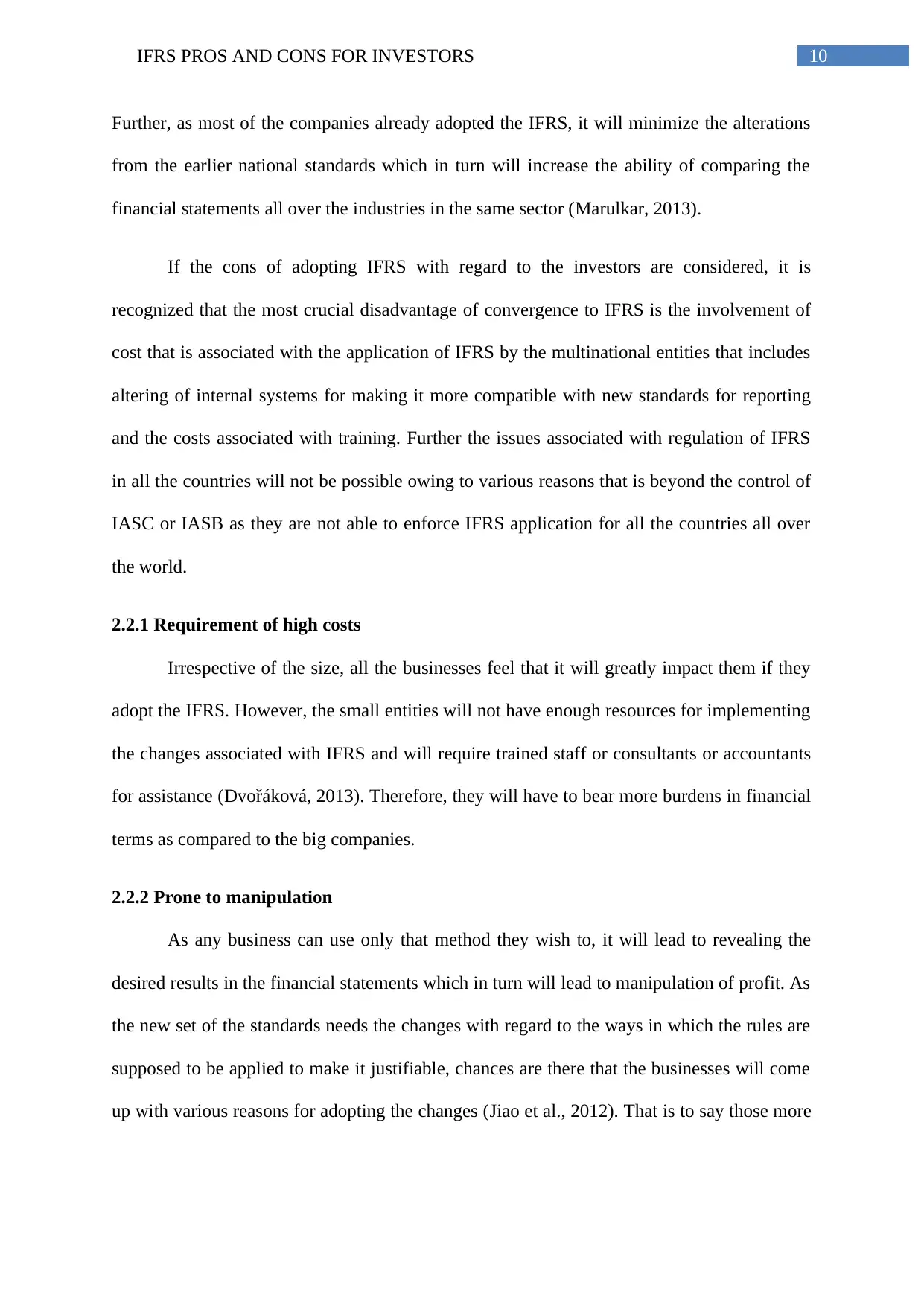
10IFRS PROS AND CONS FOR INVESTORS
Further, as most of the companies already adopted the IFRS, it will minimize the alterations
from the earlier national standards which in turn will increase the ability of comparing the
financial statements all over the industries in the same sector (Marulkar, 2013).
If the cons of adopting IFRS with regard to the investors are considered, it is
recognized that the most crucial disadvantage of convergence to IFRS is the involvement of
cost that is associated with the application of IFRS by the multinational entities that includes
altering of internal systems for making it more compatible with new standards for reporting
and the costs associated with training. Further the issues associated with regulation of IFRS
in all the countries will not be possible owing to various reasons that is beyond the control of
IASC or IASB as they are not able to enforce IFRS application for all the countries all over
the world.
2.2.1 Requirement of high costs
Irrespective of the size, all the businesses feel that it will greatly impact them if they
adopt the IFRS. However, the small entities will not have enough resources for implementing
the changes associated with IFRS and will require trained staff or consultants or accountants
for assistance (Dvořáková, 2013). Therefore, they will have to bear more burdens in financial
terms as compared to the big companies.
2.2.2 Prone to manipulation
As any business can use only that method they wish to, it will lead to revealing the
desired results in the financial statements which in turn will lead to manipulation of profit. As
the new set of the standards needs the changes with regard to the ways in which the rules are
supposed to be applied to make it justifiable, chances are there that the businesses will come
up with various reasons for adopting the changes (Jiao et al., 2012). That is to say those more
Further, as most of the companies already adopted the IFRS, it will minimize the alterations
from the earlier national standards which in turn will increase the ability of comparing the
financial statements all over the industries in the same sector (Marulkar, 2013).
If the cons of adopting IFRS with regard to the investors are considered, it is
recognized that the most crucial disadvantage of convergence to IFRS is the involvement of
cost that is associated with the application of IFRS by the multinational entities that includes
altering of internal systems for making it more compatible with new standards for reporting
and the costs associated with training. Further the issues associated with regulation of IFRS
in all the countries will not be possible owing to various reasons that is beyond the control of
IASC or IASB as they are not able to enforce IFRS application for all the countries all over
the world.
2.2.1 Requirement of high costs
Irrespective of the size, all the businesses feel that it will greatly impact them if they
adopt the IFRS. However, the small entities will not have enough resources for implementing
the changes associated with IFRS and will require trained staff or consultants or accountants
for assistance (Dvořáková, 2013). Therefore, they will have to bear more burdens in financial
terms as compared to the big companies.
2.2.2 Prone to manipulation
As any business can use only that method they wish to, it will lead to revealing the
desired results in the financial statements which in turn will lead to manipulation of profit. As
the new set of the standards needs the changes with regard to the ways in which the rules are
supposed to be applied to make it justifiable, chances are there that the businesses will come
up with various reasons for adopting the changes (Jiao et al., 2012). That is to say those more
Paraphrase This Document
Need a fresh take? Get an instant paraphrase of this document with our AI Paraphraser
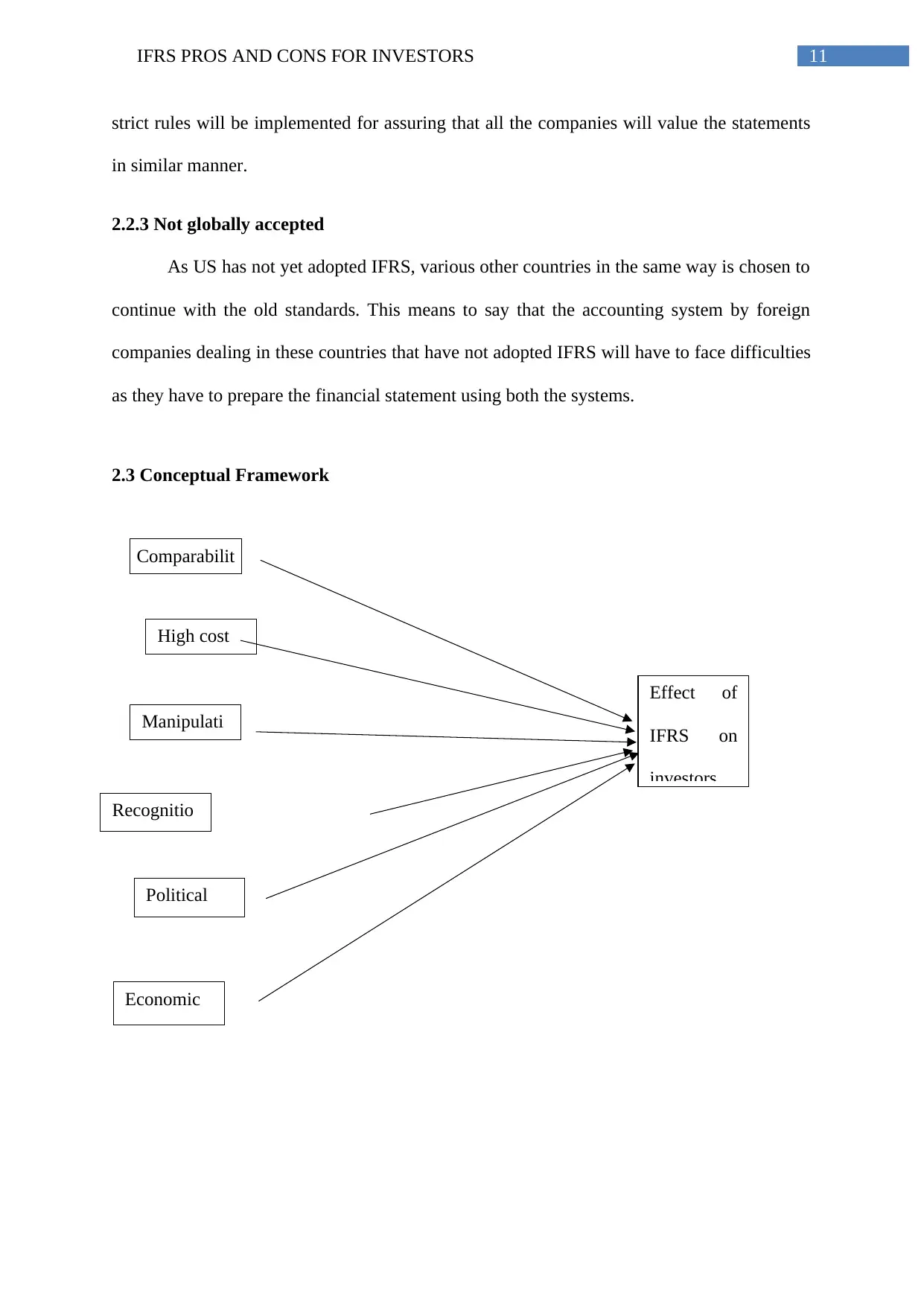
11IFRS PROS AND CONS FOR INVESTORS
strict rules will be implemented for assuring that all the companies will value the statements
in similar manner.
2.2.3 Not globally accepted
As US has not yet adopted IFRS, various other countries in the same way is chosen to
continue with the old standards. This means to say that the accounting system by foreign
companies dealing in these countries that have not adopted IFRS will have to face difficulties
as they have to prepare the financial statement using both the systems.
2.3 Conceptual Framework
Comparabilit
y
High cost
Manipulati
on
Recognitio
n of loss in
Political
effect
Economic
effect
Effect of
IFRS on
investors
strict rules will be implemented for assuring that all the companies will value the statements
in similar manner.
2.2.3 Not globally accepted
As US has not yet adopted IFRS, various other countries in the same way is chosen to
continue with the old standards. This means to say that the accounting system by foreign
companies dealing in these countries that have not adopted IFRS will have to face difficulties
as they have to prepare the financial statement using both the systems.
2.3 Conceptual Framework
Comparabilit
y
High cost
Manipulati
on
Recognitio
n of loss in
Political
effect
Economic
effect
Effect of
IFRS on
investors
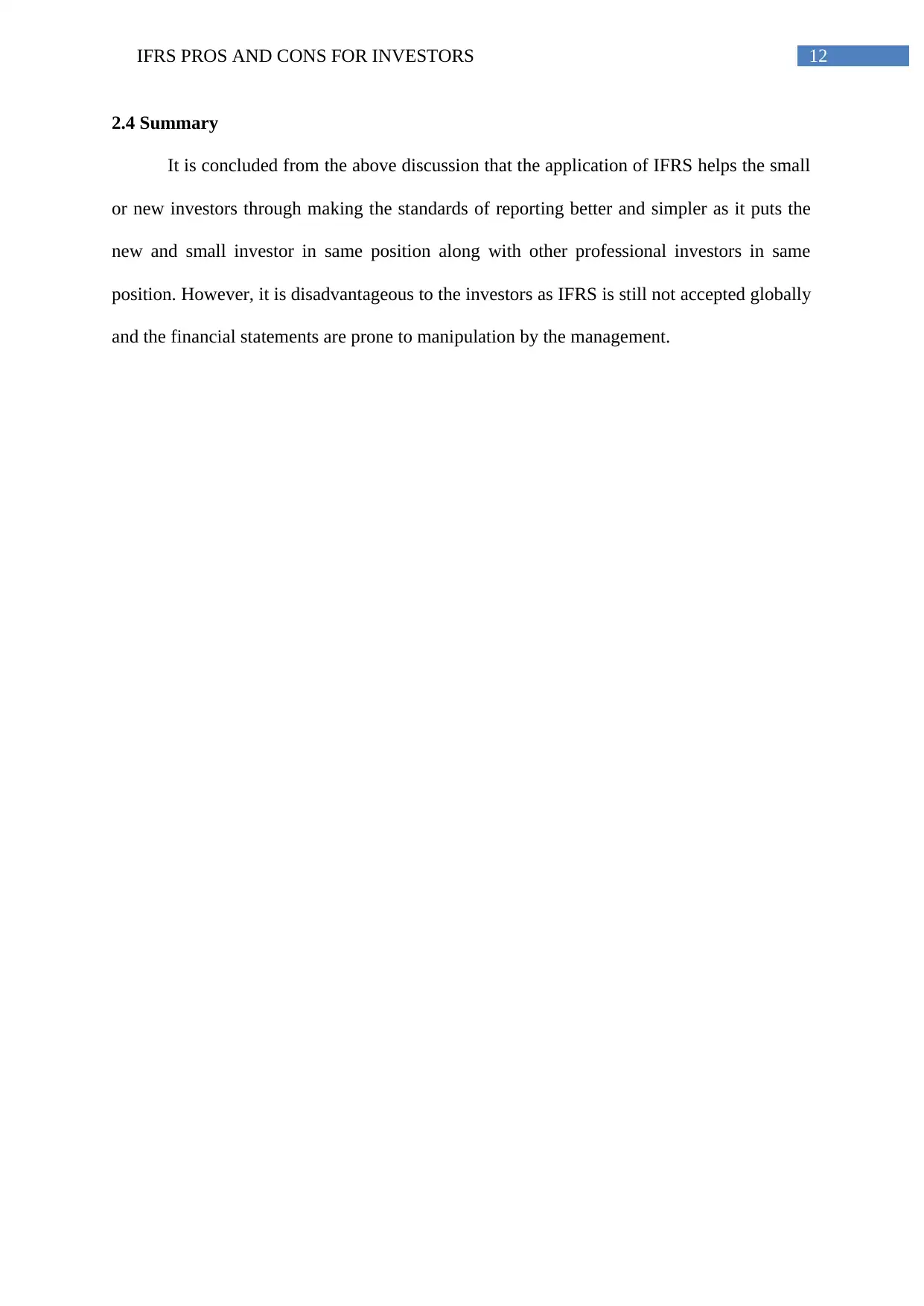
12IFRS PROS AND CONS FOR INVESTORS
2.4 Summary
It is concluded from the above discussion that the application of IFRS helps the small
or new investors through making the standards of reporting better and simpler as it puts the
new and small investor in same position along with other professional investors in same
position. However, it is disadvantageous to the investors as IFRS is still not accepted globally
and the financial statements are prone to manipulation by the management.
2.4 Summary
It is concluded from the above discussion that the application of IFRS helps the small
or new investors through making the standards of reporting better and simpler as it puts the
new and small investor in same position along with other professional investors in same
position. However, it is disadvantageous to the investors as IFRS is still not accepted globally
and the financial statements are prone to manipulation by the management.
⊘ This is a preview!⊘
Do you want full access?
Subscribe today to unlock all pages.

Trusted by 1+ million students worldwide
1 out of 25
Related Documents
Your All-in-One AI-Powered Toolkit for Academic Success.
+13062052269
info@desklib.com
Available 24*7 on WhatsApp / Email
![[object Object]](/_next/static/media/star-bottom.7253800d.svg)
Unlock your academic potential
Copyright © 2020–2025 A2Z Services. All Rights Reserved. Developed and managed by ZUCOL.





